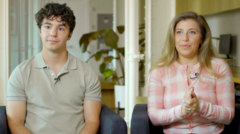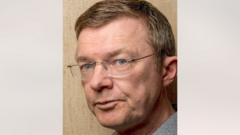As concerns grow regarding the societal implications of A.I., Pope Leo XIV has stepped forward to highlight the risks and opportunities this technology presents for humanity.
Pope Leo XIV Elevates A.I. Ethics to Global Concern

Pope Leo XIV Elevates A.I. Ethics to Global Concern
In his inaugural addresses, Pope Leo XIV emphasizes the importance of responsibly navigating the rapidly advancing field of artificial intelligence.
With only days in his papacy, Pope Leo XIV has already begun to establish himself as a voice of caution and responsibility regarding the evolving landscape of artificial intelligence. During his inaugural address to the College of Cardinals, he articulated the essential need for the church to engage with the ethical and societal risks that A.I. poses, underscoring its potential impact on human dignity, justice, and employment.
This position aligns with anxieties expressed by members of his flock. For example, in Berlin’s St. Matthias Schöneberg Church, parishioners are increasingly concerned about the reliability of information from A.I.-enabled platforms that their children encounter, along with teachers at local schools who struggle to prevent academic dishonesty fueled by these technologies. Many interpreters within this diverse parish fear for their job security as A.I. continues to evolve.
Through his remarks to journalists, Pope Leo acknowledged A.I.'s "immense potential," stressing that it brings with it a profound responsibility to use this technology for the broader good of society. Observers note that the Pope’s focus on A.I. during such an early stage of his leadership signals a deep understanding of significant modern challenges.
Father Paolo Benanti, a Franciscan friar and leading Vatican consultant on A.I. ethics, expressed surprise at the boldness of the new Pope’s priorities. He recounted that his visionary interests in topics like human enhancement had once been dismissed as eccentric just fifteen years prior. “And now it’s the first topic of a pope,” he reflected, indicating the remarkable shift in the Church's approach to contemporary issues.
Long before ascending to the papacy, Cardinal Leo, with his mathematical training, had been contemplating the implications of artificial intelligence. Last September, he proactively engaged with Father Benanti and other Vatican leaders to address how the Church should navigate the digital era. This groundwork laid the foundation for his upcoming policy focus on these emerging technologies, indicating that discussions surrounding the ethical use of A.I. within the Church are no longer just theoretical exercises but are becoming central to its mission moving forward.
This position aligns with anxieties expressed by members of his flock. For example, in Berlin’s St. Matthias Schöneberg Church, parishioners are increasingly concerned about the reliability of information from A.I.-enabled platforms that their children encounter, along with teachers at local schools who struggle to prevent academic dishonesty fueled by these technologies. Many interpreters within this diverse parish fear for their job security as A.I. continues to evolve.
Through his remarks to journalists, Pope Leo acknowledged A.I.'s "immense potential," stressing that it brings with it a profound responsibility to use this technology for the broader good of society. Observers note that the Pope’s focus on A.I. during such an early stage of his leadership signals a deep understanding of significant modern challenges.
Father Paolo Benanti, a Franciscan friar and leading Vatican consultant on A.I. ethics, expressed surprise at the boldness of the new Pope’s priorities. He recounted that his visionary interests in topics like human enhancement had once been dismissed as eccentric just fifteen years prior. “And now it’s the first topic of a pope,” he reflected, indicating the remarkable shift in the Church's approach to contemporary issues.
Long before ascending to the papacy, Cardinal Leo, with his mathematical training, had been contemplating the implications of artificial intelligence. Last September, he proactively engaged with Father Benanti and other Vatican leaders to address how the Church should navigate the digital era. This groundwork laid the foundation for his upcoming policy focus on these emerging technologies, indicating that discussions surrounding the ethical use of A.I. within the Church are no longer just theoretical exercises but are becoming central to its mission moving forward.






















